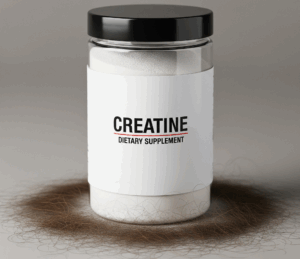Does Creatine Cause Hair Loss? A Doctor’s Perspective on Male Pattern Hair Loss and Creatine Supplementation
This is a complex question where my clinical experience appears to outpace the published medical literature.
What is Creatine and How Does it Work?
Creatine is a popular dietary supplement among athletes and fitness enthusiasts, known to enhance muscle growth and athletic performance. It aids in the production of ATP, the primary energy source for muscle contractions. While naturally present in foods, creatine is commonly taken in powder, liquid, or gummy forms. Its popularity has been cyclical, but it consistently remains a top supplement.
What Causes Male Pattern Hair Loss (Androgenetic Alopecia)?
Over 70% of men will experience some degree of hair loss in their lifetime. The most common form is androgenetic alopecia, also known as male pattern hair loss. This condition typically presents as a receding hairline at the temples and/or thinning on the crown.
The key driver of male pattern hair loss is DHT (dihydrotestosterone). In the body, an enzyme called 5-alpha reductase converts circulating testosterone into DHT, particularly in the prostate and hair follicles. DHT acts on hair follicles, causing them to miniaturize—they shrink, their blood supply decreases, and the hairs become shorter and thinner. Eventually, these hairs turn into fine “peach fuzz” and stop growing altogether. The degree of sensitivity to DHT varies greatly from person to person.
Does Creatine Affect Testosterone or DHT Levels?
The scientific literature on this topic is limited. A frequently cited 2009 study [1] on college-aged male rugby players showed that creatine supplementation significantly increased their DHT levels by up to 56% after a seven-day loading phase, with levels remaining elevated. Importantly, their total testosterone levels did not change significantly. The ratio of DHT to testosterone also increased.
While this study raised a red flag, other research has generally not shown significant changes in testosterone levels with creatine use. A more recent 2025 study [2] did not find a significant change in testosterone, DHT, or hair growth parameters, which adds to the complexity.
A Facial Plastic Surgeon’s Clinical Observations
As a facial plastic surgeon specializing in hair transplants and non-surgical hair restoration, I’ve observed a recurring pattern. Many young men in their mid-20s come in with a story of sudden, rapid hair shedding over the past 3 to 6 months. This rapid acceleration of hair loss is often different from the slower progression their fathers experienced.
When I screen these patients, a common factor is the recent introduction of a new supplement for muscle building: creatine. The story is so common that it’s now part of my standard screening process for young male patients. For those who are genetically susceptible to hair loss, creatine seems to act as an accelerant, making hair loss that might have taken years occur in just a matter of months. Unfortunately, stopping creatine does not guarantee the hair will grow back.
Hair Loss Treatment Options and Recommendations
Hair loss is more treatable now than ever before, but a proper diagnosis starts with a thorough in-person exam. While online consultations and products are popular, a physical exam provides crucial information that photos often miss.
Key treatments for androgenetic hair loss include finasteride, minoxidil, PRP/PRF (platelet-rich plasma/fibrin), laser/red light therapy, and specialized nutraceuticals. Every treatment has its own risks and benefits, and it’s essential for a patient to have a clear understanding of these before starting. The goal of proper treatment is to reverse some of the hair loss and halt its progression.
Conclusion
While the scientific data on creatine and hair loss remains inconclusive, many board-certified physicians specializing in hair restoration, including myself, believe that creatine acts as an accelerant for male pattern hair loss in genetically susceptible individuals.
More information is also on our Instagram page!
References:
- van der Merwe, J., Brooks, N. E., & Myburgh, H. J. (2009). Three weeks of creatine monohydrate supplementation affects dihydrotestosterone to testosterone ratio in college-aged rugby players. Clinical Journal of Sport Medicine, 19(5), 399-404.
- Lak, A., et al. (2025). Does creatine cause hair loss? A 12-week randomized controlled trial. Journal of the International Society of Sports Nutrition, 22(S1), 2495229.
- Candow, D. G., et al. (2021). Common questions and misconceptions about creatine supplementation: what does the scientific evidence really show? Journal of the International Society of Sports Nutrition, 18(1), 13.
